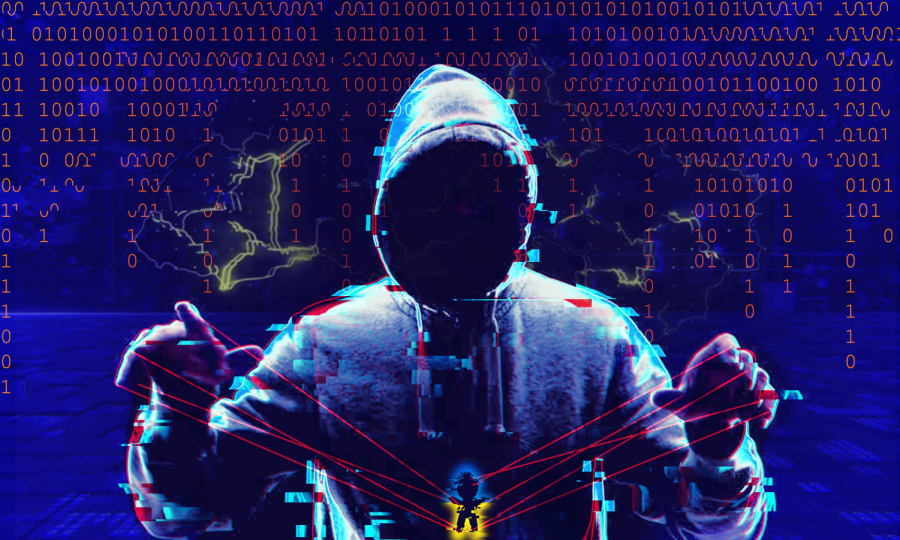A new generation of warfare
How the Russo-Ukrainian war differs from any other military conflict in history
Hacking groups have attacked both Ukrainian and Russian government websites, bringing a new era of cyber warfare. Along with other misinformation on the internet, cyber warfare tactics pose a rising threat to civilian lives.
April 12, 2022
In a room lit only by the glow of my laptop, I stare intently at a dark terminal window full of tiny white text. Esoteric phrases like “ncat” and “ssh” clutter the screen alongside various scripts and IP addresses. With a single keystroke, I run my final command, immediately extracting a list of passwords from an online server. My infiltration of this capture-the-flag target was likely similar to the technique hackers employed in January when they replaced the contents of the Ukrainian government’s official website with Russian nationalist propaganda.
The Russo-Ukrainian war, as one of the few overt international conflicts in the modern era, is perhaps the best example of hybrid warfare in history. Traditional wars have been fought by opposing military forces and supported by domestic propaganda. Although hybrid wars also utilize these older tactics, they primarily employ new, unconventional strategies made possible by the digital age. Social media networks have allowed state-sponsored disinformation to spread more widely than ever before. Technological innovations have created devastating weapons that can decimate entire cities. Cyberattacks have the potential to completely disrupt both military operations and civilian life faster than direct battle.
Cyberwarfare between Russia and Ukraine began long before armed conflict between the nations started. On Jan. 14, various Ukrainian government and bank websites were hacked and replaced with a warning written in Russian, Ukrainian and Polish that the worst was yet to come. Ukraine claimed Russia was responsible for the attack, though Russian officials denied these allegations.
Russia has also been the target of various cyberattacks by activist organizations and volunteers. The hacker coalition Anonymous leaked 200 gigabytes of documents from the Russian Ministry of Defense, hijacked Russian TV channels to broadcast banned Ukrainian news and took down the website of the largest trading exchange in Russia. Many volunteers have responded to calls from Ukrainian authorities to attack Russian digital infrastructure.
While cyberattacks and military strength have been the primary weapons of the war thus far, the invasion has become particularly tense due to increasingly dangerous prospects of nuclear warfare. By invading Ukraine, Russian President Vladimir Putin has violated the assurances of Ukrainian military security declared in the 1994 Budapest Memorandum, under which Ukraine agreed to the Nonproliferation Treaty and surrendered its nuclear warheads. Since Russia still possesses thousands of nuclear weapons, the invasion may also set a precedent that nuclear states can extort or manipulate non-nuclear states to achieve their political goals.
“The invasion of Ukraine has undermined decades of nonproliferation and disarmament progress,” Critical Issues Forum director Dr. Eric Nelson said. “Ukraine gave up its nuclear arsenal in part because of the promise by Russia that it wouldn’t invade them. We’re going to find it almost impossible to get the smaller nuclear states to disarm, and anybody that isn’t a nuclear state I suspect is seriously considering becoming one so that they don’t end up being next on the menu.”
Active military conflict and the threat of nuclear escalation mean that while Ukrainian citizens are feeling the brunt of the effects of the invasion, Russian civilians are also suffering the consequences of Putin’s actions. The Russian ruble crashed by over 30% as megacorporations like McDonald’s and General Motors left the country. Tech giants in particular have almost unilaterally pulled out of Russia in response to the invasion. Apple stopped selling its products to Russian customers a week after the invasion began. Three days later, Google disabled its advertising services for all users in the country, including YouTube and Google Search. Microsoft, Netflix, Amazon and dozens of other technology companies have also stopped sales and services in Russia to protest the attack.
The Ukrainian government has even asked that Russia be removed from the internet entirely. Ukrainian Deputy Prime Minister Mykhailo Fedorov sent a letter to the Internet Corporation for Assigned Names and Numbers (ICANN) on Feb. 28 requesting that the organization disable all of its root servers operating in Russia, then revoke Russian top-level-domains like .ru and their SSL certificates. Together, these actions would make accessing Russian websites nearly impossible. The ICANN declined, stating that its only goal is to “maintain neutrality and act in support of the global Internet” and that its mission “does not extend to taking punitive actions, issuing sanctions, or restricting access against segments of the Internet – regardless of the provocations.”
A Russian hobbyist programmer who uses the online alias “Nekit” lives in Moscow and has experienced the domestic effects of the Russo-Ukrainian conflict firsthand.
“The first thing we can obviously note is that the Russian ruble is just dropping lower and lower compared to the dollar,” Nekit said. “I would go as far as saying that we’re on the edge of the economy breaking down. There are various services, such as Spotify, which I cannot pay for because MasterCard and Visa are not working.”
As independent news organizations have been forced to close down, and as social media networks have blocked access to their services, Russian citizens have found fewer options for accessing news unmodified by the government. Russian authorities have denounced all sources of news not approved directly by the government as misinformation and have made it illegal to spread any information that contradicts official reports.
“It’s censorship,” Nekit said. “Twitter and Facebook have been blocked supposedly for being platforms for distributing false information about Russian actions in Ukraine.”
Though the conflict has not substantially affected Nekit’s programming, he has been forced to move his website domains from NameCheap, a registrar that has stopped services in Russia. JetBrains, which sells a popular suite of software development tools, has also blocked Russian customers.
Nekit acknowledges that some Russian citizens support Putin’s actions in Ukraine. The invasion supposedly aims to demilitarize the border and liberate the Ukrainian people.
“A portion of Russian people can agree to this situation, but it’s perhaps thanks to the propaganda that people are not exactly unbiased,” Nekit said. “I have actually spoken with various relatives of mine today, and they all seem to agree with the actions that Russia is taking. And the primary argument is that we are actually helping the Ukrainian citizens. But I’m not exactly sure how you’re supposed to [help] by bombing cities.”
Like many Russians, however, Nekit does not support the invasion. He is unsure how the conflict will end, especially as Putin seems to refuse to back down.
“I view the situation mostly from a pacifist point of view,” Nekit said. “The act of people killing other people is just terrible to me.”
Since Russians have been targets of online harassment since the invasion began, Nekit hopes that the Western world realizes that civilians should not be blamed for the actions of their government.
“There’s quite a large portion of people that essentially hates on Russians,” Nekit said. “They think we’re not doing enough and it’s our fault that the war is happening. Russian citizens don’t actually have any kind of control over the situation, considering that we have something quite close to a dictatorship here. We can try to help improve the situation, but we cannot do much about the government.”
As the world enters a new era of warfare, millions of lives hang in the balance of a single dispute. But only time will tell if tried-and-true diplomacy can still resolve a conflict as intricate as Russia versus Ukraine — or if the war will explode into a global storm of unprecedented destruction.


















![“[Building nerf blasters] became this outlet of creativity for me that hasn't been matched by anything else. The process [of] making a build complete to your desire is such a painstakingly difficult process, but I've had to learn from [the skills needed from] soldering to proper painting. There's so many different options for everything, if you think about it, it exists. The best part is [that] if it doesn't exist, you can build it yourself," Ishaan Parate said.](https://harkeraquila.com/wp-content/uploads/2022/08/DSC_8149-900x604.jpg)




![“When I came into high school, I was ready to be a follower. But DECA was a game changer for me. It helped me overcome my fear of public speaking, and it's played such a major role in who I've become today. To be able to successfully lead a chapter of 150 students, an officer team and be one of the upperclassmen I once really admired is something I'm [really] proud of,” Anvitha Tummala ('21) said.](https://harkeraquila.com/wp-content/uploads/2021/07/Screen-Shot-2021-07-25-at-9.50.05-AM-900x594.png)







![“I think getting up in the morning and having a sense of purpose [is exciting]. I think without a certain amount of drive, life is kind of obsolete and mundane, and I think having that every single day is what makes each day unique and kind of makes life exciting,” Neymika Jain (12) said.](https://harkeraquila.com/wp-content/uploads/2017/06/Screen-Shot-2017-06-03-at-4.54.16-PM.png)








![“My slogan is ‘slow feet, don’t eat, and I’m hungry.’ You need to run fast to get where you are–you aren't going to get those championships if you aren't fast,” Angel Cervantes (12) said. “I want to do well in school on my tests and in track and win championships for my team. I live by that, [and] I can do that anywhere: in the classroom or on the field.”](https://harkeraquila.com/wp-content/uploads/2018/06/DSC5146-900x601.jpg)
![“[Volleyball has] taught me how to fall correctly, and another thing it taught is that you don’t have to be the best at something to be good at it. If you just hit the ball in a smart way, then it still scores points and you’re good at it. You could be a background player and still make a much bigger impact on the team than you would think,” Anya Gert (’20) said.](https://harkeraquila.com/wp-content/uploads/2020/06/AnnaGert_JinTuan_HoHPhotoEdited-600x900.jpeg)

![“I'm not nearly there yet, but [my confidence has] definitely been getting better since I was pretty shy and timid coming into Harker my freshman year. I know that there's a lot of people that are really confident in what they do, and I really admire them. Everyone's so driven and that has really pushed me to kind of try to find my own place in high school and be more confident,” Alyssa Huang (’20) said.](https://harkeraquila.com/wp-content/uploads/2020/06/AlyssaHuang_EmilyChen_HoHPhoto-900x749.jpeg)









